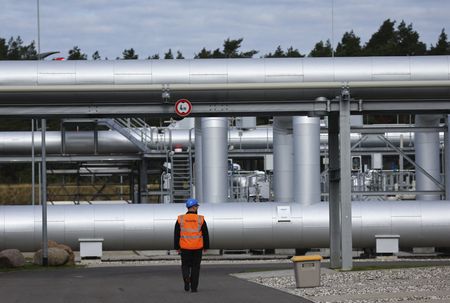By Thomas Escritt and Stine Jacobsen
BERLIN/COPENHAGEN (Reuters) -Danish authorities on Monday asked ships to steer clear of a five nautical mile radius off the island of Bornholm after a gas leak overnight from the defunct Russian-owned Nord Stream 2 pipeline drained into the Baltic Sea.
The German government said it was in contact with the Danish authorities and working with local law enforcement to find out what caused pressure in the pipeline to plummet suddenly. Denmark’s energy ministry declined to comment.
On Monday evening, the operator of the Nord Stream 1 pipeline, which ran at reduced capacity since mid-June before stopping supplies altogether in August, also disclosed a pressure drop on both lines of the gas pipeline.
“The reasons are being investigated,” Nord Stream AG said on its website, without disclosing further information.
The pipeline has been one of the flashpoints in an escalating energy war between Europe and Moscow since Russia’s invasion of Ukraine in February that has pummelled major Western economies and sent gas prices soaring.
“A leak today occurred on the Nord Stream 2 pipeline in the Danish area,” said Denmark’s energy agency in a statement.
The German network regulator president, Klaus Mueller, said on Twitter the pressure drop in both pipelines “underscores the German network regulator’s assessment that the situation is tense.”
The regulator said it was currently not known what had caused the pressure drop, adding the event had no impact on security of supply in Germany and that the country’s gas storage levels were around 91%.
Danish maritime authorities had issued a navigation warning and established a zone around the Nord Stream 2 pipeline “as it is dangerous for ship traffic”, it added.
Nord Stream 2’s operator said pressure in the pipeline, which had contained some gas sealed inside despite never becoming operational, dropped from 105 to 7 bars overnight.
The pipeline, which was intended to double the volume of gas flowing from St. Petersburg under the Baltic Sea to Germany, had just been completed and filled with 300 million cubic metres of gas when Germany cancelled it days before the invasion.
NO CLARITY
“Overnight the Nord Stream 2 landfall dispatcher registered a rapid gas pressure drop on Line A of the Nord Stream 2 natural gas pipeline,” Nord Stream 2’s operator said in a statement.
“Investigation is ongoing.”
European countries have resisted Russian calls to allow the Nord Stream 2 pipeline to operate and accused Moscow of using energy as a weapon. Russia denies doing so and blames the West for gas shortages.
“We are currently in contact with the authorities concerned in order to clarify the situation. We still have no clarity about the causes and the exact facts,” said a statement from the German economy ministry.
The Swiss-based operator, which has legally been wound up, said it had informed all relevant authorities about the leak.
Russian gas exporter Gazprom referred questions about the incident to the Nord Stream 2 operator.
Russia has cut off gas supplies to several countries and also halted flows through the Nord Stream 1 pipeline, blaming Western sanctions for hindering operations.
President Vladimir Putin in September chided the West for keeping Nord Stream 2 shut.
Monday’s gas leak happened a day before the ceremonial launch of the Baltic Pipe carrying gas from Norway to Poland.
The project is a centrepiece of Warsaw’s efforts to diversify from Russian gas. Danish Prime Minister Mette Frederiksen is due to travel to Poland on Tuesday to mark the occasion.
Nord Stream 2 was widely unpopular among Danish lawmakers and the country in 2017 passed a law which allowed it to ban the project from passing through its territorial waters on security grounds.
But Nord Stream 2 later changed the original route to steer it through Denmark’s exclusive economic zone, where this veto could not be applied.
(Reporting by Thomas Escritt, Christian Kraemer, Stine Jacobsen, Terje Solsvik, Marek Strzelecki, Matthias Williams, Christoph Steitz and Sarah Marsh; Writing by Matthias Williams; Editing by Andrea Ricci, Mark Potter and Marguerita Choy)





